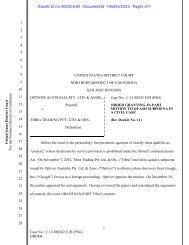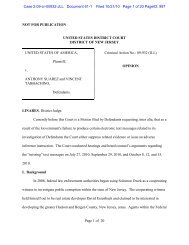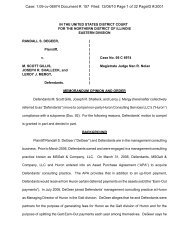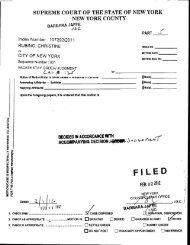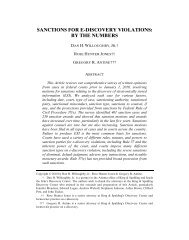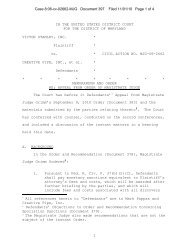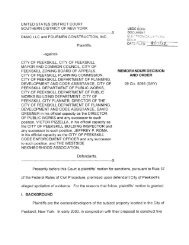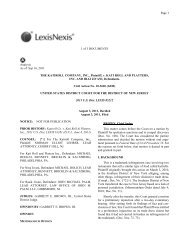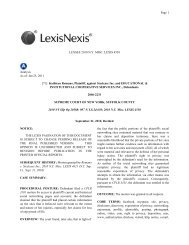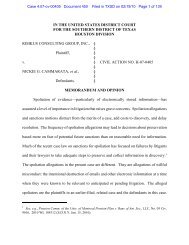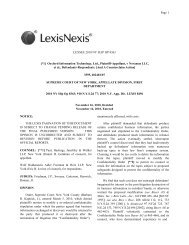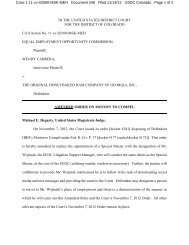Pippins v. KPMG, No. 11-377 - E-Discovery Law Alert
Pippins v. KPMG, No. 11-377 - E-Discovery Law Alert
Pippins v. KPMG, No. 11-377 - E-Discovery Law Alert
Create successful ePaper yourself
Turn your PDF publications into a flip-book with our unique Google optimized e-Paper software.
Case 1:<strong>11</strong>-cv-00<strong>377</strong>-CM-JLC Document 106 Filed 10/07/<strong>11</strong> Page 16 of 19<br />
Motion to Certify is resolved and discovery proceeds-it is not unreasonable that <strong>KPMG</strong><br />
continue its preservation at this time.<br />
Additionally, <strong>KPMG</strong>'s ongoing burden is self-inflicted to a large extent. It is suffering<br />
from the effects of its own reluctance to work with Plaintiffs to generate a reasonable sample that<br />
may well be less burdensome to maintain. (See Def.'s Mem. at 12 (citations omitted)). <strong>KPMG</strong><br />
is correct that "[t]he concept of sampling to test both the cost and the yield is now part of the<br />
mainstream approach to electronic discovery." S.E.C. v. Collins & Aikman Corp., 256 F.R.D.<br />
403,418 (S.D.N.Y. 2009) (citing Zubulake I, 217 F.R.D. at 322); see also ~~~~, 229<br />
F.R.D. at 432 CIt may be possible to run a system-wide keyword search; counsel could then<br />
preserve a copy of each 'hit.'... When the opposing party propounds its document requests, the<br />
parties could negotiate a list of search terms to be used in identifying responsive documents, and<br />
counsel would only be obliged to review documents that came up as 'hits' on the second, more<br />
restrictive search.") (footnotes omitted). However, to date, <strong>KPMG</strong> has failed to work effectively<br />
with Plaintiffs in order to generate a potential means of construeting an appropriate sample.<br />
Despite <strong>KPMG</strong>'s contention that Plaintiffs have "refus[ed] to even consider the application of<br />
search terms" as a means of producing a meaningful sample (Def.'s Mem. at 12), the record<br />
suggests that <strong>KPMG</strong> did not provide PlaintitTs with the opportunity to learn of the hard drive's<br />
contents-such as by reviewing a handful of hard drives that counsel had vetted for privilege or<br />
created a log of contents-that might have enabled them to "propound targeted requests for<br />
specific files contained within the hard drivcs at lesser cost." (PIs.' :V1em. at 12). While the<br />
Court will not direct KP:v1G to provide PlaintifTs with five hard drivcs for inspection, it<br />
encourages the parties to continue to meet and confer in light of this decision to see if an<br />
16



